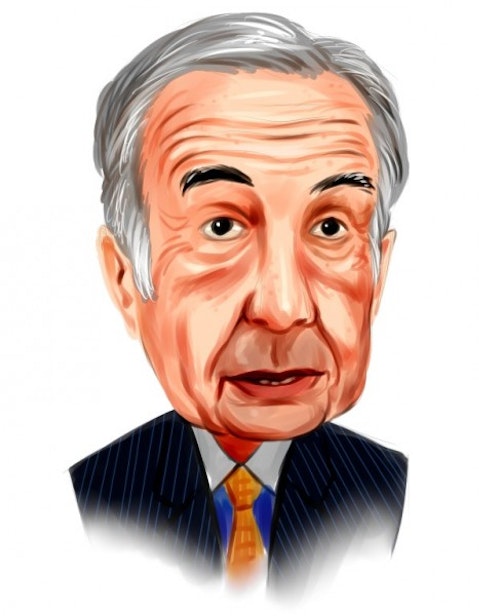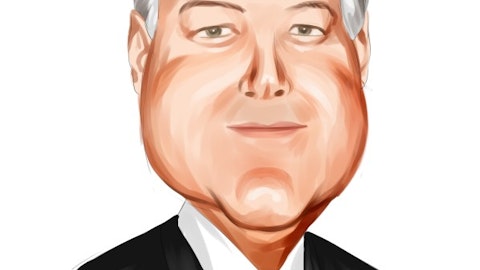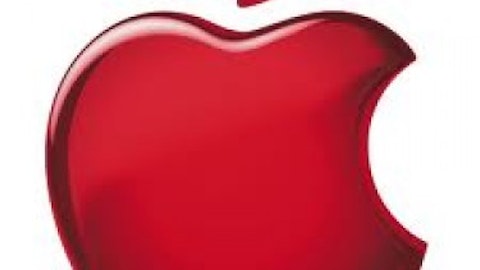The technology revolution is forcing some industries to consolidate while making others obsolete. In addition to our previous coverage of Carl Icahn versus Netflix (see his top stock picks here), we have identified five companies that are seeing new technologies strain their businesses—two of these companies are in the mobile space, two are in the retail sector and one is in the online video streaming business. These beaten down stocks are now prime takeover targets that could be gobbled up by larger companies, and some hedge funds are banking on this.
The first company is Research In Motion Limited (NASDAQ:RIMM). Down over 90% during the past five-year period, RIM now trades with a market value of $5.7 billion. Once owning over 20% of the U.S. smartphone market, RIM has fallen far from grace, now only owning just shy of 2% of the market. It has been speculated that the phone maker’s patent portfolio has substantial standalone value—north of $5 billion. At incalculable trailing and forward P/E ratios it is tough to determine exactly what kind of value investors are getting out of RIM shares. Expected to grow earnings at 10% annually for the next five years, RIM still has potential, but we see the most appreciation coming from a buyout.
The two top funds invested in RIM at the end of 3Q were Fairfax Financial and Renaissance Technologies, with both making large increases in 2Q shares owned, 90% and 140%, respectively. Together these two funds own nearly 13% of RIM’s outstanding shares. RIM is one of Fairfax’s top picks, with the Blackberry maker accounting for almost 20% of the fund’s 13F. See all of Fairfax’s top stock picks.
Nokia Corporation (NYSE:NOK) is another mobile phone company in distress—down over 90% year to date—also trading with a incalculable P/E. The next five years for Nokia look bleak, as it is expected to see an earnings decline of 1% annually. The question then becomes: who would be good suitors for either Nokia or RIM? Google, Apple, Microsoft and Samsung are all major players in the mobile phone sector; Google recently purchased Motorola for $12.5 billion to put give it a hardware component to go along with its Android OS. RIM has a cheaper market value compared to Nokia—which trades at a $12 billion market cap.
The largest fund owner at the end of 3Q for Nokia was Arrowstreet Capital with 45 million shares, which was an increase of over 75% from 2Q. Other notable investors in Nokia, although all slightly downsized their positions, were Ken Griffin, D.E. Shaw, Ken Fisher and Steven Cohen.
Best Buy Co., Inc. (NYSE:BBY) is down over 45% year to date. The retailer’s forward P/E of 6x appears cheap, but we fear it could be a value trap. Best Buy saw its biggest competitor file bankruptcy a few years ago and now Amazon is threatening to bestow the same fate on Best Buy. The stock had found a $17-$18 trading range before missing 3Q earnings by 75%, and is now priced at $13 a share. There appears to be little support for the stock at this mark, and little belief that founder Richard Schulze can come through with his $24-$26 per share suggested offer.
Best Buy is a top pick of billionaire Jeffrey Vinik (see all of Vinik’s top picks), who is also the top fund owner by shares of those we track. Vinik’s share increase during 3Q was over 200,000%, while other notable investor Bill Miller also increased his stake heavily, over 1200%. Interestingly, Best Buy is also among the top retail stores loved by hedge funds (see our top 10 here), so there’s still some confidence in certain corners of the market.
RadioShack Corporation (NYSE:RSH) is another retailer seeing pressure from e-commerce companies, including Amazon. The outlook for RadioShack appears to be very poor, where analysts expect earnings to decline by over 100% annually for the next five years. RadioShack does have a partnership with Target that allows the electronics company to sell mobile phones in Target’s stores. Although this is a near term positive, mobile phone and tablet products generally provide lower gross margins; this will continue to pressure RadioShack in the foreseeable future. RadioShack is down almost 80% year to date, but does boost over $500 million in cash on hand—around $5.50 cash per share—compared to the electronics company’s $200 million market cap.
RadioShack’s depressed valuation has kept many big funds out of its shares, but it also makes the company an attractive takeover target. The two most notable RadioShack investors during 3Q were AQR Capital and Citadel Investment Group, both boosting their 2Q stakes by close to 80%. AQR now owns over 2.2 million shares, or around 2% of the company.
Netflix, Inc. (NASDAQ:NFLX) is up almost 20% year to date, but still well below its 52-week high of $130 a share. We see Netflix as having some of the best potential prospects for a buyout. The streaming company has activist shareholders that are expected to help pressure the company to unlock shareholder value. Despite Netflix’s slowing revenue growth, from 48% in 2011 to an expected 14% in 2012 and 2013, it is expected to grow EPS by 20% annually over the next five years.
Netflix has managed to beat EPS estimates in each of the last four quarters, but concerns over international growth remain. The video company’s initiative to grow overseas will pressure its margins due to increases in content costs and marketing. Billionaire Carl Icahn believes Netflix’s best opportunities for future growth will be if a strategic buy of Netflix takes place; this could include the likes of Microsoft or Amazon.
Netflix had two billionaires taking new large positions in the online streaming company during 3Q, Carl Icahn and Eddie Lampert (learn more about Icahn’s recent move). The new positions by these famed investors put them as the top two fund owners among those we track. Another notable billionaire that took interest in Netflix during 3Q was D.E. Shaw, upping his firm’s stake by almost 1000%.
To recap: RIM saw some of the more robust interest from funds as a variety of smaller operations found value in the phone maker and took new positions in 3Q. RIM’s big bet on its Blackberry 10 OS will play a major part in whether the phone maker can regain market traction. If it cannot, it may be best served by marketing its patents and large user base for sale. Our other phone maker Nokia is currently partnered with Microsoft, which could be a suitor for either RIM or Nokia itself. Nokia still pays its once-a-year dividend that puts the stock’s current yield at almost 8%.
Moreover, we would remain cautious on both Best Buy and RadioShack. RadioShack’s small market cap could make it one of the easiest takeovers out there, and Best Buy’s recent drop below $5 billion could make Schulze’s play a reality, only now for sub-$20 a share, compared to the original $24-$26 range. Netflix has a couple top activist hedge fund managers that are already pressuring the company, which has the best growth prospects regardless of a takeover.





